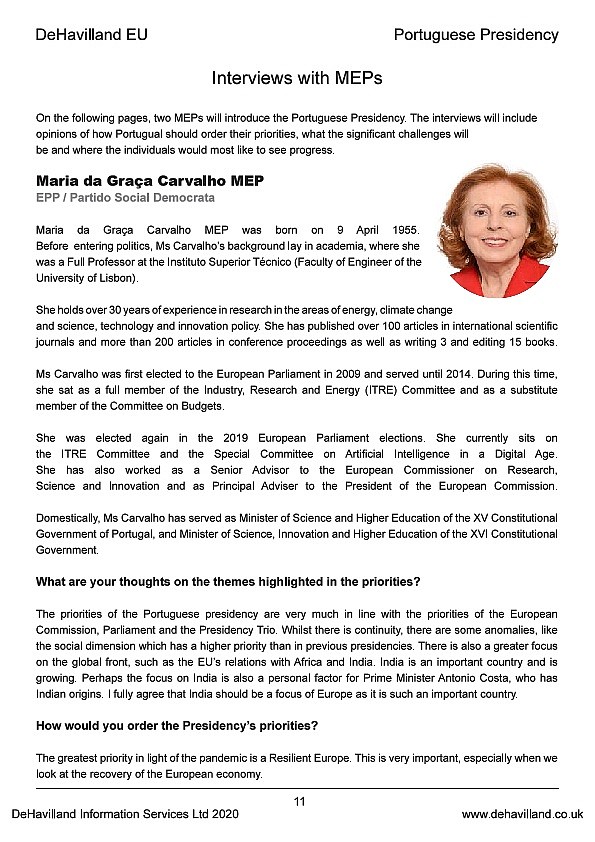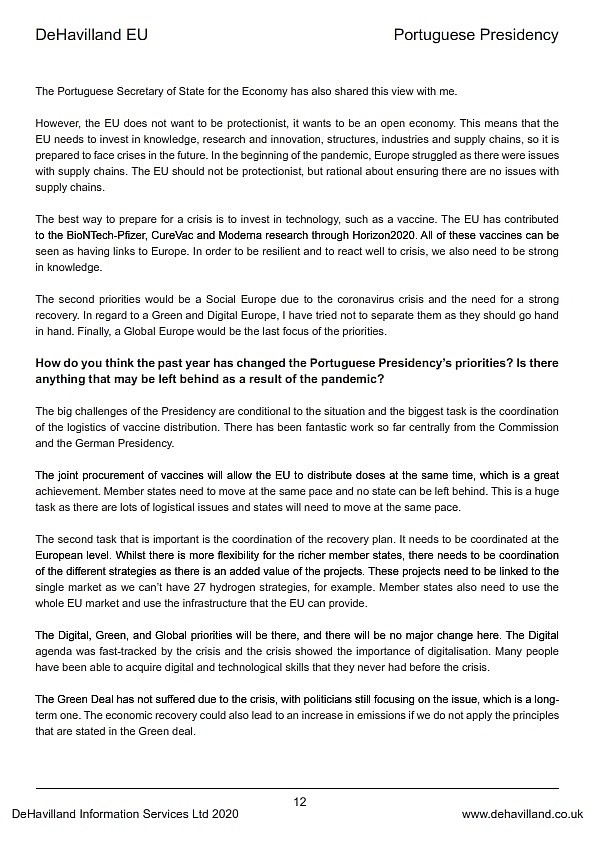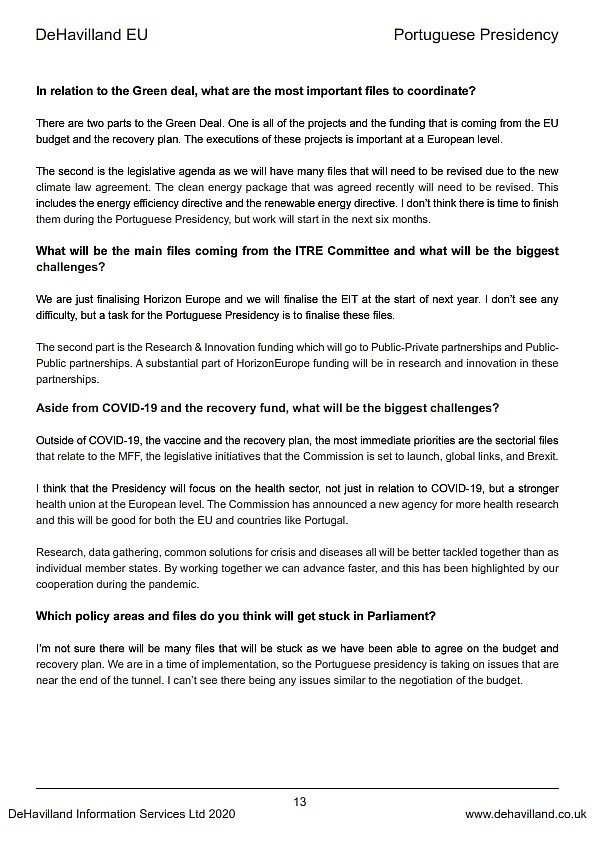Press Interviews with MEPs
On the following pages, two MEPs will introduce the Portuguese Presidency. The interviews will include opinions of how Portugual should order their priorities, what the significant challenges will be and where the individuals would most like to see progress.
Maria da Graça Carvalho MEP
EPP / Partido Social Democrata
Maria da Graça Carvalho MEP was born on 9 April 1955. Before entering politics, Ms Carvalho’s background lay in academia, where she was a Full Professor at the Instituto Superior Técnico (Faculty of Engineer of the University of Lisbon).
She holds over 30 years of experience in research in the areas of energy, climate change and science, technology and innovation policy. She has published over 100 articles in international scientific journals and more than 200 articles in conference proceedings as well as writing 3 and editing 15 books.
Ms Carvalho was first elected to the European Parliament in 2009 and served until 2014. During this time, she sat as a full member of the Industry, Research and Energy (ITRE) Committee and as a substitute member of the Committee on Budgets.
She was elected again in the 2019 European Parliament elections. She currently sits on the ITRE Committee and the Special Committee on Artificial Intelligence in a Digital Age. She has also worked as a Senior Advisor to the European Commissioner on Research, Science and Innovation and as Principal Adviser to the President of the European Commission.
omestically, Ms Carvalho has served as Minister of Science and Higher Education of the XV Constitutional Government of Portugal, and Minister of Science, Innovation and Higher Education of the XVI Constitutional Government.
What are your thoughts on the themes highlighted in the priorities?
The priorities of the Portuguese presidency are very much in line with the priorities of the European Commission, Parliament and the Presidency Trio. Whilst there is continuity, there are some anomalies, like the social dimension which has a higher priority than in previous presidencies. There is also a greater focus on the global front, such as the EU’s relations with Africa and India. India is an important country and is growing. Perhaps the focus on India is also a personal factor for Prime Minister Antonio Costa, who has Indian origins. I fully agree that India should be a focus of Europe as it is such an important country.
How would you order the Presidency’s priorities?
The greatest priority in light of the pandemic is a Resilient Europe. This is very important, especially when we look at the recovery of the European economy.
The Portuguese Secretary of State for the Economy has also shared this view with me.
However, the EU does not want to be protectionist, it wants to be an open economy. This means that the EU needs to invest in knowledge, research and innovation, structures, industries and supply chains, so it is prepared to face crises in the future. In the beginning of the pandemic, Europe struggled as there were issues with supply chains. The EU should not be protectionist, but rational about ensuring there are no issues with supply chains.
The best way to prepare for a crisis is to invest in technology, such as a vaccine. The EU has contributed to the BioNTech-Pfizer, CureVac and Moderna research through Horizon2020. All of these vaccines can be seen as having links to Europe. In order to be resilient and to react well to crisis, we also need to be strong in knowledge.
The second priorities would be a Social Europe due to the coronavirus crisis and the need for a strong recovery. In regard to a Green and Digital Europe, I have tried not to separate them as they should go hand in hand. Finally, a Global Europe would be the last focus of the priorities.
How do you think the past year has changed the Portuguese Presidency’s priorities? Is there anything that may be left behind as a result of the pandemic?
The big challenges of the Presidency are conditional to the situation and the biggest task is the coordination of the logistics of vaccine distribution. There has been fantastic work so far centrally from the Commission and the German Presidency.
The joint procurement of vaccines will allow the EU to distribute doses at the same time, which is a great achievement. Member states need to move at the same pace and no state can be left behind. This is a huge task as there are lots of logistical issues and states will need to move at the same pace.
The second task that is important is the coordination of the recovery plan. It needs to be coordinated at the European level. Whilst there is more flexibility for the richer member states, there needs to be coordination of the different strategies as there is an added value of the projects. These projects need to be linked to the single market as we can’t have 27 hydrogen strategies, for example. Member states also need to use the whole EU market and use the infrastructure that the EU can provide.
The Digital, Green, and Global priorities will be there, and there will be no major change here. The Digital agenda was fast-tracked by the crisis and the crisis showed the importance of digitalisation. Many people have been able to acquire digital and technological skills that they never had before the crisis.
The Green Deal has not suffered due to the crisis, with politicians still focusing on the issue, which is a longterm one. The economic recovery could also lead to an increase in emissions if we do not apply the principles that are stated in the Green deal.
In relation to the Green deal, what are the most important files to coordinate?
There are two parts to the Green Deal. One is all of the projects and the funding that is coming from the EU budget and the recovery plan. The executions of these projects is important at a European level.
The second is the legislative agenda as we will have many files that will need to be revised due to the new climate law agreement. The clean energy package that was agreed recently will need to be revised. This includes the energy efficiency directive and the renewable energy directive. I don’t think there is time to finish them during the Portuguese Presidency, but work will start in the next six months.
What will be the main files coming from the ITRE Committee and what will be the biggest challenges?
We are just finalising Horizon Europe and we will finalise the EIT at the start of next year. I don’t see any difficulty, but a task for the Portuguese Presidency is to finalise these files.
The second part is the Research & Innovation funding which will go to Public-Private partnerships and Public-Public partnerships. A substantial part of HorizonEurope funding will be in research and innovation in these partnerships.
Aside from COVID-19 and the recovery fund, what will be the biggest challenges?
Outside of COVID-19, the vaccine and the recovery plan, the most immediate priorities are the sectorial files that relate to the MFF, the legislative initiatives that the Commission is set to launch, global links, and Brexit.
I think that the Presidency will focus on the health sector, not just in relation to COVID-19, but a stronger health union at the European level. The Commission has announced a new agency for more health research and this will be good for both the EU and countries like Portugal.
Research, data gathering, common solutions for crisis and diseases all will be better tackled together than as individual member states. By working together we can advance faster, and this has been highlighted by our cooperation during the pandemic.
Which policy areas and files do you think will get stuck in Parliament?
I’m not sure there will be many files that will be stuck as we have been able to agree on the budget and recovery plan. We are in a time of implementation, so the Portuguese presidency is taking on issues that are near the end of the tunnel. I can’t see there being any issues similar to the negotiation of the budget.



